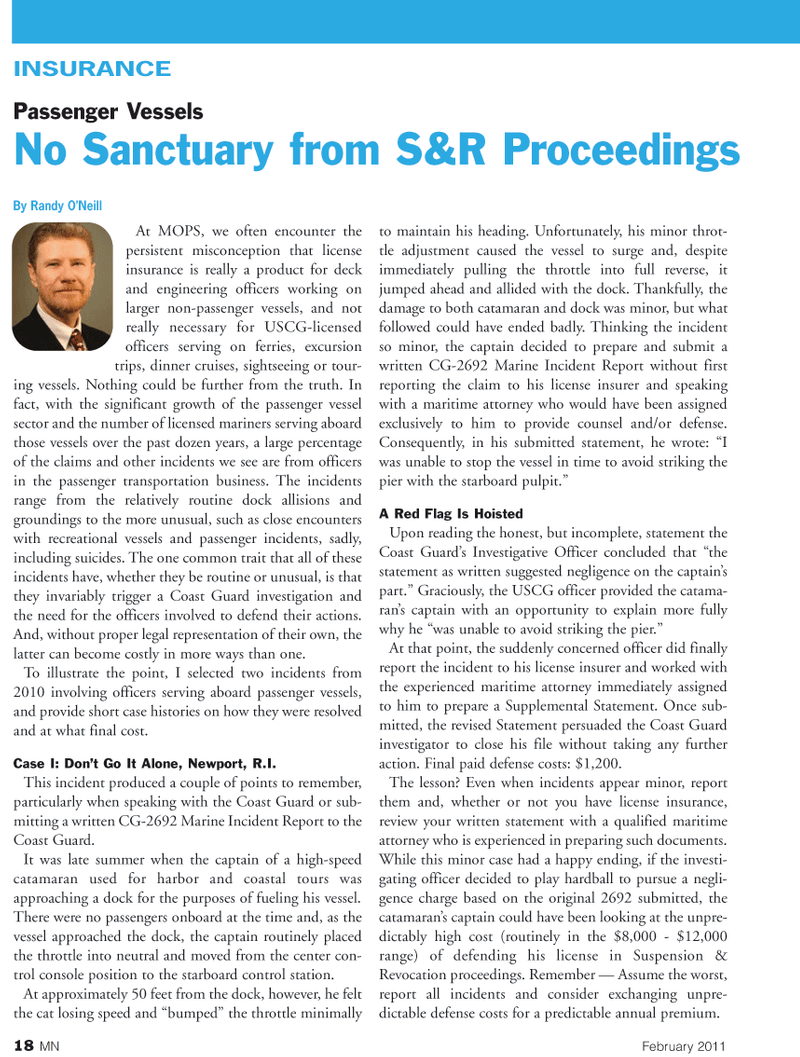
Page 18: of Marine News Magazine (February 2011)
Inland Waterways
Read this page in Pdf, Flash or Html5 edition of February 2011 Marine News Magazine
18 MN February 2011
INSURANCE
At MOPS, we often encounter the persistent misconception that license insurance is really a product for deck and engineering officers working on larger non-passenger vessels, and not really necessary for USCG-licensed officers serving on ferries, excursion trips, dinner cruises, sightseeing or tour- ing vessels. Nothing could be further from the truth. In fact, with the significant growth of the passenger vessel sector and the number of licensed mariners serving aboard those vessels over the past dozen years, a large percentage of the claims and other incidents we see are from officers in the passenger transportation business. The incidents range from the relatively routine dock allisions and groundings to the more unusual, such as close encounters with recreational vessels and passenger incidents, sadly, including suicides. The one common trait that all of these incidents have, whether they be routine or unusual, is that they invariably trigger a Coast Guard investigation and the need for the officers involved to defend their actions.
And, without proper legal representation of their own, the latter can become costly in more ways than one.
To illustrate the point, I selected two incidents from 2010 involving officers serving aboard passenger vessels, and provide short case histories on how they were resolved and at what final cost.
Case I: Don’t Go It Alone, Newport, R.I.
This incident produced a couple of points to remember, particularly when speaking with the Coast Guard or sub- mitting a written CG-2692 Marine Incident Report to the
Coast Guard.
It was late summer when the captain of a high-speed catamaran used for harbor and coastal tours was approaching a dock for the purposes of fueling his vessel.
There were no passengers onboard at the time and, as the vessel approached the dock, the captain routinely placed the throttle into neutral and moved from the center con- trol console position to the starboard control station.
At approximately 50 feet from the dock, however, he felt the cat losing speed and “bumped” the throttle minimally to maintain his heading. Unfortunately, his minor throt- tle adjustment caused the vessel to surge and, despite immediately pulling the throttle into full reverse, it jumped ahead and allided with the dock. Thankfully, the damage to both catamaran and dock was minor, but what followed could have ended badly. Thinking the incident so minor, the captain decided to prepare and submit a written CG-2692 Marine Incident Report without first reporting the claim to his license insurer and speaking with a maritime attorney who would have been assigned exclusively to him to provide counsel and/or defense.
Consequently, in his submitted statement, he wrote: “I was unable to stop the vessel in time to avoid striking the pier with the starboard pulpit.”
A Red Flag Is Hoisted
Upon reading the honest, but incomplete, statement the
Coast Guard’s Investigative Officer concluded that “the statement as written suggested negligence on the captain’s part.” Graciously, the USCG officer provided the catama- ran’s captain with an opportunity to explain more fully why he “was unable to avoid striking the pier.”
At that point, the suddenly concerned officer did finally report the incident to his license insurer and worked with the experienced maritime attorney immediately assigned to him to prepare a Supplemental Statement. Once sub- mitted, the revised Statement persuaded the Coast Guard investigator to close his file without taking any further action. Final paid defense costs: $1,200.
The lesson? Even when incidents appear minor, report them and, whether or not you have license insurance, review your written statement with a qualified maritime attorney who is experienced in preparing such documents.
While this minor case had a happy ending, if the investi- gating officer decided to play hardball to pursue a negli- gence charge based on the original 2692 submitted, the catamaran’s captain could have been looking at the unpre- dictably high cost (routinely in the $8,000 - $12,000 range) of defending his license in Suspension &
Revocation proceedings. Remember — Assume the worst, report all incidents and consider exchanging unpre- dictable defense costs for a predictable annual premium.
Passenger Vessels
No Sanctuary from S&R Proceedings
By Randy O’Neill

 17
17

 19
19
